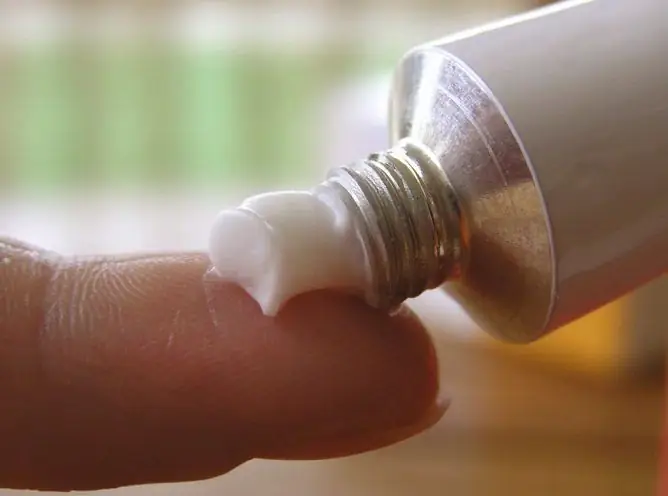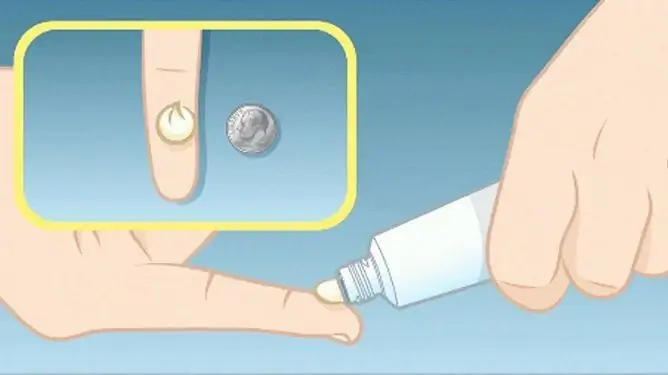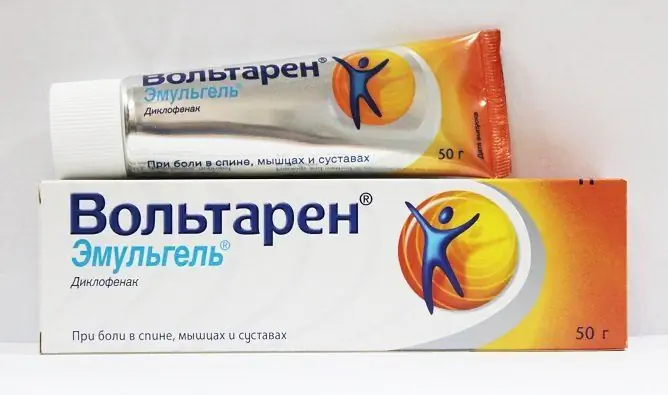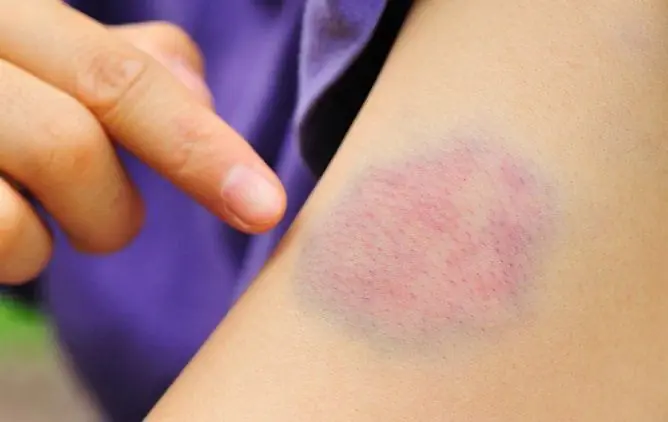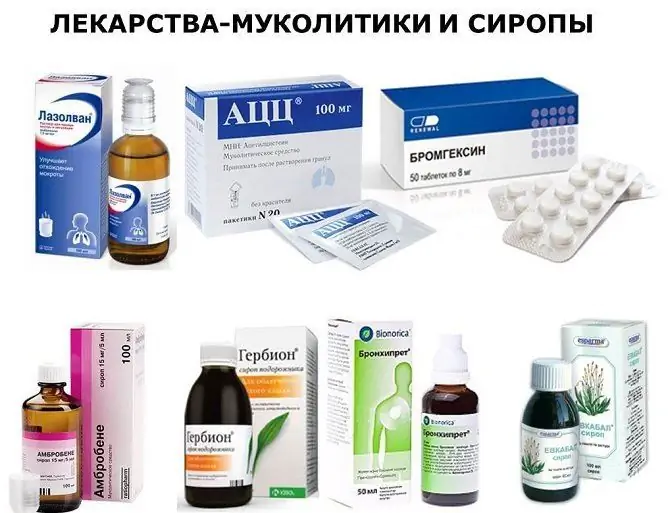- Author Rachel Wainwright wainwright@abchealthonline.com.
- Public 2024-01-15 19:51.
- Last modified 2025-11-02 20:14.
Ointments for bruises, bruises and edema, analgesic, anti-inflammatory and warming action
The content of the article:
-
Review of inexpensive and effective ointments for bruises and bruises
- Warming agents
- Non-steroidal anti-inflammatory drugs
- Arnica based
- Ointments and gels with anticoagulants
- Gels with troxerutin
- Badiaga
- Contusion and its consequences
- First aid for bruises
- When to see a doctor
- Video
There is a fairly large list of ointments for bruises, bruises and edema of anesthetic, anti-inflammatory, warming and combined action. Various injuries, especially falls and blows with blunt objects, occur quite often in the life of any person. In most cases, they do not require medical attention, and it is quite possible to cope with their consequences on your own at home.

Correctly applied bruise ointments can relieve pain and speed up healing
Review of inexpensive and effective ointments for bruises and bruises
In the assortment of any pharmacy, various ointment gels are widely represented, which have anesthetic, resorption and warming effect. Such medicines should be chosen taking into account the mechanism of action, indications and contraindications for use. Consider the main drugs for the local treatment of bruises.
Warming agents
Their use is allowed no earlier than 48 hours from the moment of injury. They quickly relieve pain, relieve puffiness, help quickly get rid of bruises. Apply to the skin with light movements and leave until completely absorbed. You cannot rub them in.
| Name | Mechanism of action | Application rules |
| Nikoflex | The main active ingredient is capsaicin, which has a warming, anti-inflammatory, analgesic effect |
Apply to the skin with a thin layer 1-2 times a day. The drug is contraindicated in the presence of individual intolerance, damage to the skin |
| Espol | It contains red pepper extract. The analgesic effect develops within 10-15 minutes after applying the ointment and lasts up to three hours | Use 1-2 times a day, applying on the skin with a thin layer. The course of treatment should not exceed 10-12 days. |
| Efkamon | It is widely used in sports medicine for the treatment of soft tissue injuries, sprains and resorption of hematomas. Has the ability to quickly relieve pain, enhance tissue regeneration | 2-3 grams of ointment is applied to the injury site, rubbed into the skin and covered with a bandage |
| Apisatron | A good remedy that improves local blood supply, stimulates metabolic processes, increases the elasticity of ligaments and muscles | The ointment is applied in a thin layer, the damaged area is covered with a warm bandage. Apply 2-3 times a day until pain disappears |
| Viprosal | The drug contains the components of viper venom, salicylic acid and camphor. Thanks to the active ingredients, Viprosal has an analgesic and antiseptic effect, and also has a mild keratolytic effect. | Before applying the ointment, the skin is moistened with warm water. Rub the ointment with light movements for a minute. It should be used no more than 1-2 times a day. |

Evkamon ointment with warming action
Non-steroidal anti-inflammatory drugs
Ointments containing NSAIDs (non-steroidal anti-inflammatory drugs) have a rapid analgesic, anti-inflammatory and decongestant effect. However, their use is possible only as directed by a doctor.
| Naming | Mechanism of action | Mode of application |
| Ibuprofen | The main active ingredient of the drug inhibits the activity of cyclooxygenase, which ensures the development of analgesic and anti-inflammatory effects | A strip of ointment no more than 10 cm long is applied to the skin and rubbed until completely absorbed. Use 1-4 times a day |
| Diclofenac | Has the same healing effect as ibuprofen | The maximum daily dose is 8 g of the drug. Frequency of use 1-3 times a day |
| Fastum gel | The active ingredient is ketoprofen. Due to the gel structure, the drug easily penetrates into the thickness of soft tissues, providing a quick and pronounced effect | Rub into skin every 12 hours |

Fastum gel has anti-inflammatory effect
Arnica based
Arnica extract is widely used in medicine. It has the following effects:
- absorbable;
- pain reliever;
- anti-inflammatory.
The following drugs are most popular:
| Name | Mechanism of action | Application rules |
| Vitateca | The active ingredients of the ointment are extracts of badyaga and arnica, menthol, camphor and propolis. Promotes rapid resorption of hematomas | A small amount of cream is applied to the skin at the site of injury and rubbed with light massaging movements for 2-3 minutes |
| Arnigel | The healing effect of the gel is associated with the presence of arnica extract in the composition | Apply 2 times a day for 7-10 days |
| Arnica | The preparation contains only natural ingredients. It has analgesic, anti-inflammatory, regenerating, antiseptic and resorption effects | Apply to the skin in the area of injury every 8-12 hours until the main symptoms are eliminated |

Arnigel - a remedy with arnica extract
Ointments and gels with anticoagulants
Reduce blood clotting, thereby promoting accelerated resorption of hematomas. They should be used only with the permission of a doctor and not earlier than 24-72 hours from the moment of injury. Most often used in traumatology:
| Name | Mechanism of action | Application features |
| Heparin ointment | When applied to the site of a bruise, heparin is gradually released from it, which normalizes the processes of blood coagulation, microcirculation and improves metabolism in tissues | A small amount of ointment is applied to the place of the greatest soreness of the skin and rubbed gently. Apply no more than 2-3 times a day |
| Dolobene | Combined preparation containing heparin, dexpanthenol and dimethyl sulfoxide. Has an anticoagulant, anti-inflammatory and pronounced regenerative effect | The gel is applied to the skin 2-4 times a day. To enhance the healing effect, the skin area can be covered with a bandage. If necessary, the gel can be used for iontophoresis |
| Heparoid Zentiva | Reduces the intensity of hematoma formation at the site of injury. It has a good analgesic effect. The remedy is especially effective for the treatment of hematomas located on the face | With a slight injury, the ointment is rubbed into the skin with a thin layer. With a large area and / or depth of the lesion, the drug is applied to the skin, after which an airtight bandage is applied and left for 8-10 hours |

Dolobene ointment contains an anticoagulant that helps with bruising
Gels with troxerutin
Troxerutin is a substance belonging to the group of flavonoids and has antioxidant, decongestant, anti-inflammatory, angioprotective and venotonic effects. Part of Troxevasin and Venorutinol.
When the gel is applied to the skin, troxerutin quickly penetrates into the dermis and subcutaneous fatty tissue. It helps to reduce puffiness, suppresses the activity of inflammation, relieves pain.
Badiaga
Previously, badyaga was used only in traditional medicine. But numerous scientific studies have proven its effectiveness, and now it is widely used in the treatment of rheumatism, hematomas, bruises.
In the pharmacy network, there are many different creams that include badyaga. The most popular ones are:
- cream "Badiaga";
- cream "Badiaga 911";
- gel "Badyaga-forte"

Means with badyagu well help with bruises and hematomas
If necessary, you can prepare a cream with a badagi yourself. To do this, badyagi powder is mixed with vegetable oil until a thick substance is formed. It is applied to the place of damage and rubbed (put gloves on your hands!) For 5-10 minutes. If there is no severe discomfort, then the mass is left for 8-10 hours. When a burning sensation appears, the badagu is washed off the skin with warm water.
The considered list of drugs used for external treatment of bruises, hematomas and edema is far from complete. For the correct choice of a medicine, it is better not to rely on the advice of friends or pharmacists, but to consult a doctor. With this approach, the treatment of bruises will be fast, effective and safe.
Contusion and its consequences
A bruise is a closed injury to soft tissues that is not accompanied by a significant violation of their structure. It is caused by being hit by a blunt object or falling. Clinically manifested by the following symptoms:
- pain;
- swelling of damaged tissues;
- the formation of areas of hemorrhage (hematomas, bruises);
- dysfunction.
Depending on the characteristics of the impact of the mechanical damaging factor, bruises may be accompanied by:
- skin necrosis followed by rejection;
- bruises and detachments of the periosteum;
- violation of the integrity of the bones;
- hemarthrosis of the joints;
- concussion or contusion of the brain;
- violation of cerebral circulation (with neck injuries);
- violation of the blood supply to the spinal cord (with back injuries);
- breathing disorders and cardiac arrest (with chest injuries);
- damage to the abdominal organs.
First aid for bruises
If the integrity of the skin is damaged during an injury, then the wound or abrasion should be treated with one of the antiseptic solutions:
- ethanol;
- 5% iodine solution;
- 1% solution of brilliant green (brilliant green).
To prevent the formation of a significant hematoma and associated swelling in the first few hours after injury, an ice pack or cold lotions are applied to the damaged soft tissues.
In case of severe pain, the victim can be given a pill of any drug from the NSAID group. It is strictly forbidden to use any kind of anesthetic drugs for injuries, including closed ones, of the abdominal cavity!
When to see a doctor
Most injuries to children and adults are harmless and do not require medical attention. With a strong traumatic effect, when there is a high risk of damage to the brain and spinal cord, supporting apparatus, internal organs, self-medication can pose a danger to the life and health of the victim. Signs of such damage are:
- severe pain and impaired motor function of the injured limb;
- labored breathing;
- severe pain in the abdomen;
- nausea, vomiting;
- growing general weakness;
- impairment of consciousness (from slight lethargy to deep coma).
Video
We offer for viewing a video on the topic of the article.

Elena Minkina Doctor anesthesiologist-resuscitator About the author
Education: graduated from the Tashkent State Medical Institute, specializing in general medicine in 1991. Repeatedly passed refresher courses.
Work experience: anesthesiologist-resuscitator of the city maternity complex, resuscitator of the hemodialysis department.
Found a mistake in the text? Select it and press Ctrl + Enter.

